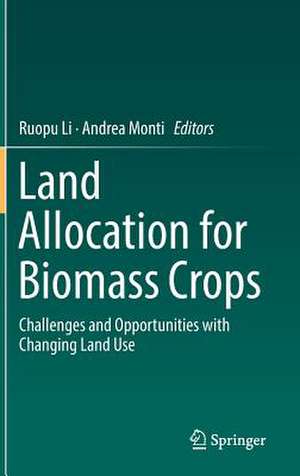Land Allocation for Biomass Crops: Challenges and Opportunities with Changing Land Use
Editat de Ruopu Li, Andrea Montien Limba Engleză Hardback – 18 mai 2018
The expansion of biomass production is often at the cost of reduced land availability for food production and losses of areas with ecological functions such as forests and wetlands. This process often involves complex interplay of physical dynamics and human systems that are driven by numerous geographic and socio-economic factors at different scales. Thus, the state-of-the-art research on the land use issues surrounding the biomass production and its environmental impacts is important for informed land management decision making. This book will be of great use to researchers in land use management and biomass-based renewable energy, as well as practitioners.
| Toate formatele și edițiile | Preț | Express |
|---|---|---|
| Paperback (1) | 384.48 lei 6-8 săpt. | |
| Springer International Publishing – 24 ian 2019 | 384.48 lei 6-8 săpt. | |
| Hardback (1) | 391.79 lei 6-8 săpt. | |
| Springer International Publishing – 18 mai 2018 | 391.79 lei 6-8 săpt. |
Preț: 391.79 lei
Nou
Puncte Express: 588
Preț estimativ în valută:
74.97€ • 78.28$ • 61.91£
74.97€ • 78.28$ • 61.91£
Carte tipărită la comandă
Livrare economică 15-29 aprilie
Preluare comenzi: 021 569.72.76
Specificații
ISBN-13: 9783319745350
ISBN-10: 3319745352
Pagini: 240
Ilustrații: XI, 217 p. 52 illus., 34 illus. in color.
Dimensiuni: 155 x 235 mm
Greutate: 0.5 kg
Ediția:1st ed. 2018
Editura: Springer International Publishing
Colecția Springer
Locul publicării:Cham, Switzerland
ISBN-10: 3319745352
Pagini: 240
Ilustrații: XI, 217 p. 52 illus., 34 illus. in color.
Dimensiuni: 155 x 235 mm
Greutate: 0.5 kg
Ediția:1st ed. 2018
Editura: Springer International Publishing
Colecția Springer
Locul publicării:Cham, Switzerland
Cuprins
Chapter 1. Introduction.- Chapter 2. Trends in Land Use in Spain and Their Implications to Bioenergy Production.- Chapter 3. Impact of Conservation Compliance on Availability of Land for Corn Stover Harvesting.- Chapter 4. Biophysical Constraints for Land Allocation of Switchgrass (Panicum virgatum L.) and Giant Reed (Arundo donax L.) in Europe, Italy.- Chapter 5. Planning the Next-Generation Biofuel Crops in the U.S. Corn Belt: A Land Suitability Analysis.- Chapter 6. Spatio-temporal Change of Agricultural Biertomass Capacity in the North China Plains.- Chapter 7. Switchgrass Adoption as a Tool for Agro-ecosystem Resilience: Results of a Survey in an Iowa Watershed.- Chapter 8. Farmers’ Acreage Responses to Sugarcane Ethanol Industry Expansion.- Chapter 9. Production of Energy Crops in Contaminated Land - Opportunities and Risks.- Chapter 10. Changes in Agricultural Greenhouse Gas Emissions from Cellulosic Biofuel Production.- Chapter 11. Resolving Biomass andFood Security through Land Allocation.
Notă biografică
Prof. Ruopu Li is an Assistant Professor in the Department of Geography and Environmental Resources at Southern Illinois University-Carbondale. His research interests include biomass-related land use modeling, water resources modeling and management, and spatial data analytics. His recent research focuses on natural resources constraints on biomass cultivation and nonpoint source pollution associated with the crop production.
Prof. Andrea Monti is full Professor in crop science at the University of Bologna. He is the head of the Research Group of Industrial Crops in the Department of Agricultural and Food Sciences. His current research activity mainly focuses on lignocellulosic and oil crops. During the last 10 years he took part in more than 15 international projects on non-food crops, and presently, he coordinates an EU-Brazil cooperation project on advanced biofuels (BECOOL).
Prof. Andrea Monti is full Professor in crop science at the University of Bologna. He is the head of the Research Group of Industrial Crops in the Department of Agricultural and Food Sciences. His current research activity mainly focuses on lignocellulosic and oil crops. During the last 10 years he took part in more than 15 international projects on non-food crops, and presently, he coordinates an EU-Brazil cooperation project on advanced biofuels (BECOOL).
Textul de pe ultima copertă
This edited volume establishes a forum for international experts to explore cutting-edge questions associated with the land use and biomass production. Topics include ‘do we have enough land, either primary or marginal, to accommodate future production of biomass?’, ‘how are farming decisions made in response to biomass incentives?’, ‘is the current bio-mass production socially, economically and environmentally sustainable?’, and ‘what are the main constraints currently limiting biofuel deployment?’
The expansion of biomass production is often at the cost of reduced land availability for food production and losses of areas with ecological functions such as forests and wetlands. This process often involves complex interplay of physical dynamics and human systems that are driven by numerous geographic and socio-economic factors at different scales. Thus, the state-of-the-art research on the land use issues surrounding the biomass production and its environmental impacts is important for informed land management decision making. This book will be of great use to researchers in land use management and biomass-based renewable energy, as well as practitioners.
The expansion of biomass production is often at the cost of reduced land availability for food production and losses of areas with ecological functions such as forests and wetlands. This process often involves complex interplay of physical dynamics and human systems that are driven by numerous geographic and socio-economic factors at different scales. Thus, the state-of-the-art research on the land use issues surrounding the biomass production and its environmental impacts is important for informed land management decision making. This book will be of great use to researchers in land use management and biomass-based renewable energy, as well as practitioners.
Caracteristici
Presents cutting-edge research associated with land use and biomass production Analyzes the issues surrounding biomass production and sustainability within the context of land use, suitability and allocation Summarizes research implications for land policy makers to make better informed decisions for land allocation, biomass production and food security
